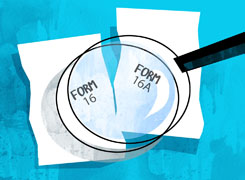Samkit Maniar |180 Answers |Ask -Follow
Tax Expert - Answered on May 27, 2024
He has graduated from Mumbai’s N M College of Commerce and Economics and has completed his CA from The Institute of Chartered Accountants of India."... more

My Salary income is 6LPA also I have STCG of 3LPA but now I have incurred loss of 1LPA. What tax planning should I do to save taxes as my total income is 8LPA. Should I go with old or new tax regime also what deduction should I opt for how much
PPF / LIC / ELSS - 150000
MEDICLAIM - 50000
MEDICLAIM FOR SENIOR CITIZEN PARENTS - 25000
NPS - 50000
HRA at actuals. Housing loan / Student loan / Donation also at actuals.
Please take your CAs advice before moving ahead.
You may like to see similar questions and answers below
Mihir Tanna |1033 Answers |Ask -Follow
Tax Expert - Answered on Feb 23, 2023
Ramalingam Kalirajan |8093 Answers |Ask -Follow
Mutual Funds, Financial Planning Expert - Answered on Jul 27, 2024
Milind Vadjikar |1106 Answers |Ask -Follow
Insurance, Stocks, MF, PF Expert - Answered on Nov 03, 2024
T S Khurana |398 Answers |Ask -Follow
Tax Expert - Answered on Feb 10, 2025
Prof Suvasish Mukhopadhyay |500 Answers |Ask -Follow
Career Counsellor - Answered on Mar 12, 2025
Milind Vadjikar |1106 Answers |Ask -Follow
Insurance, Stocks, MF, PF Expert - Answered on Mar 12, 2025
Milind Vadjikar |1106 Answers |Ask -Follow
Insurance, Stocks, MF, PF Expert - Answered on Mar 12, 2025
Milind Vadjikar |1106 Answers |Ask -Follow
Insurance, Stocks, MF, PF Expert - Answered on Mar 12, 2025
Milind Vadjikar |1106 Answers |Ask -Follow
Insurance, Stocks, MF, PF Expert - Answered on Mar 12, 2025
Dr Dipankar Dutta |956 Answers |Ask -Follow
Tech Careers and Skill Development Expert - Answered on Mar 12, 2025
Radheshyam Zanwar |1412 Answers |Ask -Follow
MHT-CET, IIT-JEE, NEET-UG Expert - Answered on Mar 12, 2025
Radheshyam Zanwar |1412 Answers |Ask -Follow
MHT-CET, IIT-JEE, NEET-UG Expert - Answered on Mar 12, 2025
T S Khurana |398 Answers |Ask -Follow
Tax Expert - Answered on Mar 12, 2025
T S Khurana |398 Answers |Ask -Follow
Tax Expert - Answered on Mar 12, 2025



























